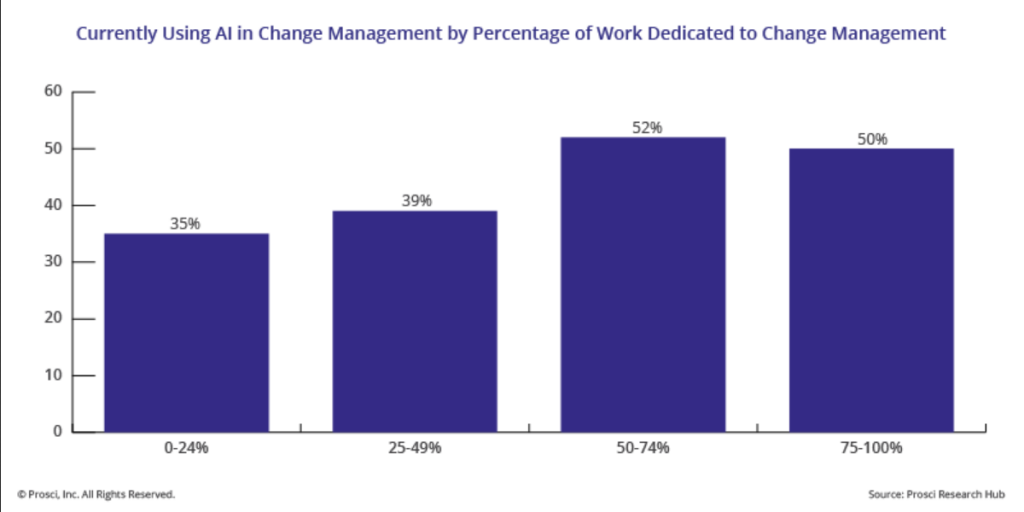In the realm of organizational change, practitioners may find themselves taking on two roles simultaneously.
Each is critical – but with a distinct focus.
These are the Change Facilitator and the Trusted Advisor.
Daryl Conner’s work provides a framework by which to understand these roles and their differences and similarities.
It also offers insight into why this distinction adds value to any change initiative.
Along with this, as artificial intelligence (AI) grows alongside change management, those roles start to look a bit different.
It also puts a premium on developing soft skills – especially emotional intelligence, critical thinking, and empathy.
The Change Facilitator vs. The Trusted Advisor
Change Facilitators serve to foster the transformation journey overall.
They’re enablers, using different tools and theories to lead people and teams through the chaos of change.
Their roles may include any or all of the following:
- facilitating workshops,
- managing resistance,
- ensuring alignment with strategic objectives,
- developing implementation deliverables, and,
- executing the change management plan.
In contrast, the Trusted Advisor operates at a much more consultative level.
They provide expert counsel and advice to senior executives across the organization but primarily focus on change leaders and sponsors.
Trusted advisors establish relationships based on trust and credibility that provide insights, recommendations, and perspectives to guide leaders’ decisions about change and often help change leaders and sponsors develop the capability to effectively lead change.
Their role extends beyond mere facilitation, to strategic partnership and long-term collaboration.
Differences and Similarities
Though both involve supporting the process of change, they go about it differently and focus on different matters.
The Change Facilitator is more tactical.
They deal with the execution of change initiatives and the day-to-day issues such as resistance or communication.
On the other hand, the Trusted Advisor takes a holistic strategic approach.
They work with leaders to develop the overall change roadmap, and support and advise the client during different phases of organizational change.
However, despite these differences, there are notable similarities between the two roles.
Both require an intimate grasp of organizations, communication skills, and the capacity to build relationships with stakeholders.
Further, they involve being continuously engaged in learning and iterating to respond to a dynamic context and set of challenges.
The Role of Artificial Intelligence in Change Management
With artificial intelligence powering everything from data analytics to data-gathering and assessment, it may change the role of the change agent and trusted advisor.
A recent study by Prosci shows that professionals with 5+ years’ experience whose work is primarily change management use AI for 50% or more of their work:

AI technologies enable the processing and analysis of massive amounts of data.
This provides organizations with insights that can underpin change decisions.
In this changing picture, AI supports the functions of the types of careers that also assist change prioritization.
This includes change facilitators and the position of the trusted advisor by automating much of the gathering of data, developing analytics, and reporting on them.
This, in turn, frees up the human capital of the change professional involved in these roles to concentrate on higher-value activities.
Examples include interpreting data, synthesizing insight, or developing meaningful human relationships.
Advancing Soft Skills in the Digital Era
But as change management becomes more of a job computers can accomplish at least at the tactical and analytical level, the importance of humanizing through soft skills becomes more acute.
Emotional intelligence helps make sense of the human complexities involved in change.
The need for good empathy, communication, and relationship-building comes back full circle.
As a result, it helps people come together and find ways to co-create toward shared aspirations in the face of complex uncertainties.
Furthermore, good thinking skills – especially synthesis, challenging assumptions, and creative problem-solving – balance these multiple perspectives.
Strategic enactment builds on that shared knowledge by explicitly connecting change initiatives to overarching organizational goals and priorities – and plausibly generating sustainable results in terms of them.
Conclusion: The Trusted Advisor Continues To Play A Pivotal Role – When They Pivot
While the specific ways in which change facilitators and trusted advisors operate will continue to evolve with technological advances, the need for change facilitators and trusted advisors is not going away.
It’s a matter of pivoting with the times.
Furthermore, the more artificially intelligent (AI) change management systems amplify the speed and efficacy of that process, the more soft skills come matter.
Through investing in emotional intelligence, cognitive flexibility, and bootstrapping, change professionals can traverse the complexity of our digital age.
This creates organization-wide change that has staying power.
Join us at Change Tech Rising and discover how the combination of traditional change management practices enmeshed with technology and soft skills come together to raise your game as a trusted advisor.







